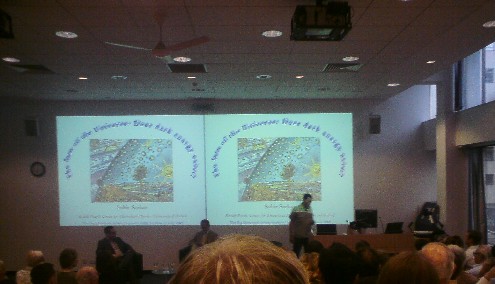
Trivial matters: Subir Sarkar sets up for his dark energy demolition job
By James Dacey
People often ask me – usually in bewildered tones – what is was that could possibly have appealed to me about physics, let alone convinced me it was a good idea to go study this baffling subject at university.
So it goes… I normally find myself agreeing with them that school physics could be intensely dull, inaccessible, and completely disconnected from everyday life. “But“, I tell them, it was the big ideas that got me in the end – the sense that I was grappling with some of the most profound questions we could ever ask. More recently, I have developed an interest in some of the more “mundane” areas of the subject – particularly the pursuit of sustainable energy innovations – but it is still the bigger picture stuff that really feeds my passion.
I was reminded of all this last night when I popped along to Imperial College in the heart of London town to attend a public debate on “The Fate of the Universe”. The two speakers tackling this small topic were Imperial’s own Andrew Jaffe – an astrophysicist who you may know through his blog Leaves on the Line and Subir Sarkar – a theoretical physicist from the Rudolf Peierls Centre at Oxford.
Jaffe was up first and he introduced the idea of dark energy. He is a firm believer in the stuff and pitched the model as a means of explaining why the rate of expansion of the universe is speeding up when really it should be slowing down under the attractive force of gravity. The American physicist argued that, whilst not perfect, dark energy is the best model we have to fit the data.
Sarkar was second to take the stage and he put forward a very different view. He immediately urged us – along with all working cosmologists – to abandon this “ridiculous” notion of a mysterious repulsive fluid that allegedly fills 75 % of the universe. The impassioned theorist cited various reasons for his suspicion of dark energy but his main points seemed to be:
It’s too convenient – that this force only acts over cosmological scales making it nigh-on impossible to observe with any confidence.
There’s an irreconcilable discrepancy (10120) – between the cosmological constant predicted by quantum mechanics and that which falls out from measuring the rate of acceleration of the universe. Maybe the observations are wrong!
Learn from history – The Aristotelian view of the Universe may seem silly to us now but it held for 2000 years; dark energy has been around for just ten years and it already shows signs of cracking. “Cosmologists are often wrong but never in doubt,” Sarkar said in jest quoting Landau, the great 20th century Soviet theorist.
One of the more mind-boggling suggestions put forward by Sarkar is that our galaxy could be residing in some sort of void in the fabric of space-time that makes the universe appear to be accelerating at a very different rate than is actually happening on the cosmic scale.
At the end of the evening we were all asked to vote on whether we thought dark energy exists or not. It’s certainly one of the stranger things I’ve been to the ballots for but I guess we were really voting for the physicist who had put forward the most convincing and entertaining arguments. Despite this being just a bit of fun, it was still interesting to see Sarkar sweep to victory by such a significant margin. I had thought that his all-questions-few-answers approach might have frustrated some and steered them towards the “doubtless” Jaffe.
Well, perhaps this goes to show that it is not just me who enjoys asking the big questions without necessarily needing an answer for them.
The Fate of the Universe was part of an ongoing lecture series called “The Big Questions”, organized by the Astrophysics Group at Imperial College.



